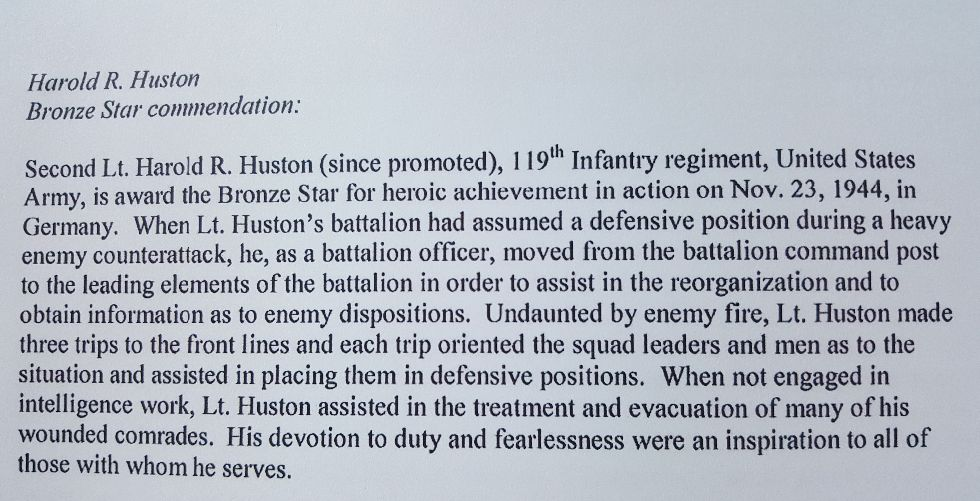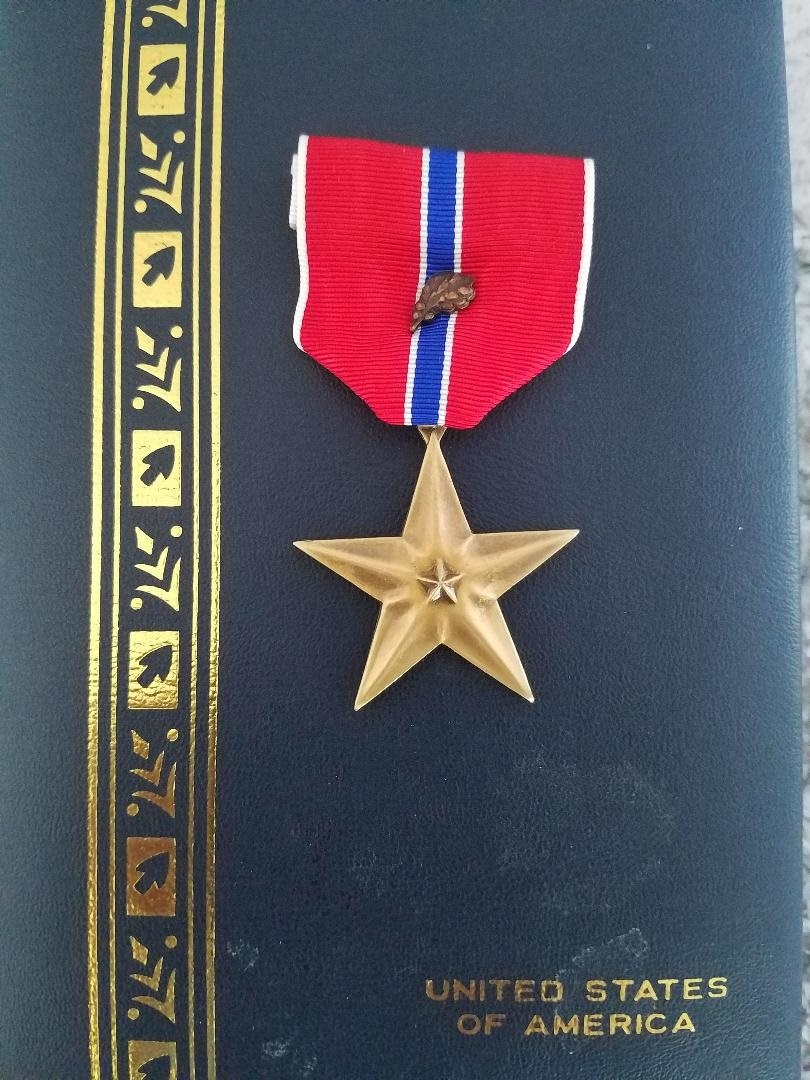"With his back to the Rhine, [the German] fought for each grubby crossroads village as if it were the Brandenburg Gate in Berlin." A quote from Omar N. Bradley, A Soldier's Story.
On our tour of Dad's war experience, we visited Merzenhauzen, where Dad was awarded his Bronze Star for valor. Merzenhauzen is a small town on the Roer Plain. We had lunch in a great restaurant that was part of an old castle. The town is nice, but not especially interesting. It's probably about 3,000 inhabitants and sits on a relatively flat, agricultural area. The quote from General Bradley about "grubby crossroads town" is fairly apt description of Merzenhausen, as a crossroads, although not "grubby", at least not now.
Here are several excerts from the Combat History of the 119th Regiment. It shows that battle action that was going on around Merzenhauzen during the time that Dad received the Bronze Star.
On the 22nd, elements of the Second Battalion advanced to take
Merzenhausen. The town offered the Germans one of their favorite situations for defense, being on a stream withhigh ground behind it. They had used it at Mortain, on the Seine, at Valkenburg, in Siegfried Line and again here. The platoon of Company G was held up by fire from entrenchments in front of the town, about 300 yards away. A platoonof Company E was committed and pinned down. The balance of Company G was committed with a platoon of
tanks. Enemy entrenchments in front of the town were finally cleared almost entirely by 81-mm. mortar fire. The mortar observer attached to Company E took the assignment. A tank shell hit so close to him that it destroyed
his radio and he had to crawl under heavy fire to obtain another from Company E. His fire was effective enough to cause numerous casualties among the enemy and to disorganize the others in the entrenchments. Only then were
Companies G and E able to enter the town. As Company G moved down the main street, a camouflaged enemy tank opened up with machine gun and 75-mm fire, wounding four men.
Shortly afterwards the enemy struck with two Mark VI tanks and about a company of infantry. Our defenses had already been weakened by the loss of eight tanks and a large number of wounded. The enemy overran the forward platoon of Company G and disorganized our support, which was digging in in an orchard on the left of the town, as riflemen was sent to hold the left flank from further collapse, until reinforcements could be found. Corporal Henry C. Klander, who had been in the town with forward elements of Company G earlier in the night, led a three-man patrol into the section of town retaken by the enemy, to contact isolated riflemen. The patrol found 20 riflemen and tankers and brought them back to strengthen the left flank. Though Company G lost considerable ground, it was able to hold a quarter of the town until it could resume the attack again in the morning. On the 23rd they regained control of about two-thirds of the town. The enemy resistance and counterattacks on the Corps front, including the 29th Division on the right, became so serious that the remainder of the Regiment was alerted.
The 3rd Squad lead the American advance down main street Merzenhausen...basically the only street. As they stepped into the street and turned to walk down it, a German Panther, (machine guns blazing away) with supporting infantry was coming right at them. O'Leary was killed in the street but King and Herrig quickly ducked into an open door and down the basement...both of the men were wounded. Nolan and the rest ran south between houses. Nolan located a bazooka team and set it up in an opening between two house, facing the street. The opening was about 4 foot wide and the patiently waited for the German tank to move by the opening. German tanks were notoriously quiet...hard to hear in all the noise of battle. It was about a 20/30 ft. shot. But as the tanked passed the bazooka would not fire. Apparently the battery was dead. There is no question on Nolan's mind that one shot would have made the tank a burning inferno. So they had to hightailed it out of there. This action is mentioned in the 119th history above. Back to Herrig and the other men hiding in the house basement. Herrig had been hit in the left leg but not seriously. However, King had been hit in the groin and was in much worse shape. Herrig could only think that this was it....the end...there was not getting out of this situation. It was going to be either death or POW. As they hid in the basement Germans entered the house above. They stayed the entire night upstairs. The Americans below had to be as quiet as they had ever been in their life. King was in fear of bleeding to death and thought maybe they should just surrender. But even with the German guards as they exchanged duty, shining they fancy German flashlights down the basement stairs, they were not discovered. But each long hour, minute, Herrig expected to hear a German hand grenade come rolling down the stairs. And on top of all this, a German tank pulled up to close to the house and the basement wall just about caved in on the men!!! The next morning the men heard voices upstairs and to their utter joy, they were American. The men were hauled out of the basement and taken back to the CP for dinner. And what a dinner it was!! The day was Thanksgiving!! A Thanksgiving feast Cletus Herrig will NEVER forget and forever be thankful for.
The battle in Merzenhausen bounced back and forth indecisively. Early on the 26th, when E and F Companies attacked, we had barely a foothold in the southwestern end of town. With their artillery and mortar barrages, which inflicted heavy casualties, the enemy was desperately defending the town house by house, with snipers and machine guns in the houses and from foxholes in the gardens. Early in the attack when the leading Equad of Company F scattered for cover from the sniper and machine gun fire. S/Sgt. William J. Peterson went ahead, throwing grenades into the windows and foxholes. After four buildings had been cleared, the second platoon was again held up by machine gun and bazooka fire coming from a house 100 yards farther up the street.
A patrol sent from Company F after dark was attacked on the slope beyond the town by an enemy patrol of 20 men. The Germans lost four men killed and five wounded in the encounter, and another enemy patrol was stopped with similar losses at the bridge by Company E. At midnight the enemy pierced the eastern end of town in force, with two Tiger tanks, four lighter tanks, and a Company of infantry riding and walking. Pfc. Arion L. Adams and Pvt. Russell R. Teague, of Company F, a bazooka team halted the drive and held until help arrived. They had some success against the enemy infantry with grenades.
When the tanks came within 35 yards, two direct hits by the bazooka stopped and turned them back. However, their bazooka flashs had given their position away and the enemy infantry, with grenades and small arms, forced them to abandon their foxholes and take cover in a creek. They remained in the frigid water for 40 minutes, bringing fire on the enemy infantry. Artillery had been called for and, falling heavily on the enemy tanks and infantry, made them give up the attack, though reluctantly, and withdraw. As the Company recovered its ground, help was brought to Pvt. Mason H. Armstrong, who had been cut off by the enemy attack. With his M-1 he had killed at least one of the infantry riding the lead tank and had fired AT grenades at the second. When the attack passed by and cut him off, he refused to surrender and survived. Shortly after their withdrawal, the Germans sent back a patrol to the Company F lines. It was discovered, driven back, and one prisoner, full of information, was taken. It was learned that the bulk of enemy armor and infantry had withdrawn to Barmen, leaving the high ground immediately northeast of Merzenhausen unoccupied. He also informed us that a force was being organized to rescue the German captain and the others who had been taken prisoner with him. The force was located on the information and when it refused to surrender, was dispersed with artillery. Company F took the high ground northeast of Merzenhausen before daylight.

